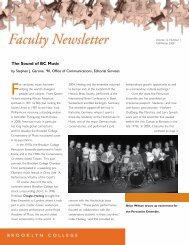Volume 14, Number 2 - Spring 2011 - Brooklyn College - CUNY
Volume 14, Number 2 - Spring 2011 - Brooklyn College - CUNY
Volume 14, Number 2 - Spring 2011 - Brooklyn College - CUNY
You also want an ePaper? Increase the reach of your titles
YUMPU automatically turns print PDFs into web optimized ePapers that Google loves.
All of us want to be happy, but if asked<br />
to explain the nature of happiness, we<br />
find that this familiar concept becomes<br />
obscure. Perhaps such elusiveness explains the<br />
fascination with happiness that extends back<br />
to the ancient Greeks.<br />
<strong>Volume</strong> XIV <strong>Number</strong> II<br />
For several years philosophy professor Christine Vitrano has been spreading the word in<br />
lectures and writing about happiness and its many faces. As you’ll learn below, the visages<br />
of happiness have changed over the centuries, and not all of them are the smiley ones<br />
of popular psychology books. With a focus on ethics, Vitrano joins the ancient and the<br />
modern, and she is now (appropriately enough) working on a book about happiness.<br />
At our invitation she agreed – happily! – to write the overview you’ll read here.<br />
The Search for Happiness Should Begin with a Question<br />
By Christine Vitrano, Philosophy<br />
Although philosophy has had a rich history<br />
of theorizing about happiness, today the study<br />
of the subject is dominated by empirically<br />
minded researchers in other disciplines. The<br />
years during which I was writing my dissertation<br />
on happiness saw the rise of the positive<br />
psychology movement. While I was acquainting<br />
myself with the philosophical literature on<br />
happiness, I noticed an increasing number<br />
of books, magazine articles and television<br />
segments focused on this new empirical<br />
research. But, although provocative, this<br />
new empirical research does not address<br />
philosophical questions about the nature and<br />
value of happiness. Researchers in this recent<br />
field generally assume that the concept of<br />
happiness is something that can be measured,<br />
and their work usually focuses on the causes of<br />
happiness and ways to increase it. In contrast,<br />
philosophers adopt a different starting point,<br />
beginning with the question: What is happiness?<br />
1<br />
Through conceptual analysis, philosophers try<br />
to provide meaningful accounts of the nature of<br />
happiness and the relation of other values such<br />
as intelligence and moral character.<br />
Since completing my dissertation, I<br />
have continued to work on issues related to<br />
happiness, morality and the good life. I have<br />
also developed a course on happiness that<br />
is now regularly offered by the philosophy<br />
The Happiness Issue<br />
The Search for Happiness<br />
BC’s Professors Are Happiest<br />
Christine Vitrano,<br />
Philosophy<br />
Faculty Notes<br />
Collaborations<br />
“Happiness<br />
depends<br />
upon<br />
ourselves.”<br />
—Artistotle
The Search for Happiness<br />
“Happiness is the<br />
greatest good.”<br />
— Jeremy Bentham<br />
In Nicomacheam Ethics, Aristotle says pleasure is not to be equated with happiness:<br />
Now for most men their pleasures are in conflict with one another because these are not by nature<br />
pleasant, but the lovers of what is noble find pleasant the things that are by nature pleasant; and<br />
virtuous actions are such . . . Happiness then is the best, noblest, and most pleasant thing in the<br />
world, and these attributes are not severed . . .<br />
department. This course typically attracts a<br />
broad range of students, many of whom have<br />
never taken a philosophy course outside the<br />
core curriculum. Teaching this course has<br />
heightened my appreciation for the questions<br />
and concerns ordinary people have about<br />
happiness and has made me aware of how much<br />
our view of happiness has changed over time.<br />
It has also helped inspire my current research<br />
project, which is the longitudinal tracing of the<br />
philosophical evolution of happiness, from its<br />
ancient roots to its current bloom.<br />
To illustrate the kinds of theories<br />
philosophers have offered, I shall contrast two<br />
philosophical perspectives on happiness: One<br />
equates happiness with virtue, and the other<br />
equates happiness with pleasure. These two<br />
perspectives represent opposite ends of the<br />
spectrum. At one end are objective theories,<br />
which require that to be deemed happy one meet<br />
certain normative criteria. At the other end are<br />
subjective theories, which view happiness as a<br />
function of the subject’s attitude towards her life.<br />
Remaining theories are hybrids, combining both<br />
subjective and objective elements.<br />
I’ll begin by considering probably the most<br />
influential objective theory, that of Aristotle.<br />
He identifies happiness as the highest human<br />
good, but in what specifically does happiness<br />
consist? Aristotle believes that the good of<br />
all things resides in their function, so he is led<br />
to consider the function of human beings.<br />
Just as a good knife is one that cuts well, a<br />
good person is one who achieves excellence<br />
in the distinctive human virtues related to<br />
character and intellect. Such a person thereby<br />
attains happiness. This Aristotelian view is<br />
clearly objective, for it places a restriction on<br />
the achievement of happiness. If one fails to<br />
achieve moral and intellectual virtue, then<br />
regardless of how satisfied she is with her life,<br />
she will not be happy.<br />
In contrast to the Aristotelian perspective,<br />
hedonism views happiness as just an experience<br />
of pleasure. Hedonism was endorsed by Jeremy<br />
Bentham and John Stuart Mill, who were<br />
both utilitarians. Utilitarianism is the moral<br />
theory that judges an act as morally right if<br />
it maximizes the happiness (or pleasure) of<br />
everyone the act affects. According to Bentham,<br />
happiness is nothing more than being in the<br />
right mental state, namely one with maximum<br />
pleasure and minimum pain. Bentham believed<br />
all pleasures were alike in quality and differed<br />
only in quantity. His hedonic calculus lists<br />
several criteria, such as frequency, intensity<br />
and duration that should be considered when<br />
evaluating comparable pleasures. Bentham’s<br />
view is subjective because it leaves judgments<br />
of happiness entirely to the subject; insofar<br />
as one is experiencing pleasure, she is happy.<br />
Bentham believed that all pleasures are<br />
alike, meaning that the pleasure one gets<br />
from reading a novel or writing poetry is no<br />
different in value from the pleasure one gets<br />
from playing children’s games, his perceived<br />
opposites. Critics of utilitarianism found this<br />
implication disturbing, because activities that<br />
are base, degrading or shallow receive the same<br />
moral consideration as activities that cultivate<br />
our minds and develop our talents. These<br />
critics argue that utilitarianism debases human<br />
beings by implying that human life has no<br />
higher purpose than the pursuit of pleasure,<br />
and they argue it is a moral theory fit for swine,<br />
not human beings.<br />
In his reply to these charges, Mill introduced<br />
the distinction between higher and lower<br />
pleasures. Mill argues that all pleasures are not<br />
equal, for some pleasures are intrinsically more<br />
valuable than others. According to Mill, higher<br />
pleasures, which involve the intellect, are<br />
intrinsically better than lower pleasures, which<br />
arise from bodily sensations and are typically<br />
enjoyed by animals. We can evaluate the merits<br />
of the two kinds of pleasures by appealing<br />
to someone who has experienced both, for,<br />
according to Mill, no person would be willing<br />
to trade a higher pleasure for the lower, even if<br />
the higher is more difficult to obtain.<br />
2 3<br />
Mill’s introduction of higher and lower<br />
pleasures adds an objective element to his<br />
view of happiness. Although Mill is a hedonist<br />
who reduces happiness to pleasure, his view<br />
is closer to the Aristotelian perspective that<br />
connects happiness with what is unique about<br />
human beings, namely our intellectual and<br />
moral capacities. Like Mill, many contemporary<br />
philosophers have been influenced by the<br />
Aristotelian conception of happiness, and<br />
their accounts often include various normative<br />
constraints on how one can pursue happiness.<br />
My own view is that happiness is best<br />
represented by the life satisfaction view, a<br />
subjective theory that judges a person as happy<br />
when she is satisfied with her life or views<br />
it positively. The more positive her outlook,<br />
the happier she will be. According to the life<br />
satisfaction view, when we say that someone is<br />
happy, we imply nothing about the goodness<br />
of her life independent of her own perceptions.<br />
Happiness represents an independent<br />
evaluative domain, which is distinct from a<br />
person’s moral and intellectual character.<br />
The Aristotelian perspective denies the<br />
happiness of anyone who fails to achieve a life<br />
of moral and intellectual virtue, but I believe this<br />
approach fundamentally misconstrues ordinary<br />
people’s behavior and motivations, resulting in<br />
a theory that is severed from reality. After all,<br />
we do find “happy” immoralists, people who<br />
knowingly break the rules of society and appear<br />
unaffected by it. Furthermore, we frequently<br />
understand people’s behavior by referring to<br />
their belief that such behavior will increase their<br />
happiness, even when that behavior is self-<br />
destructive or immoral. If we cannot explain<br />
their motivation in terms of happiness, how can<br />
we explain why they act immorally or contrary<br />
to their own well-being?<br />
“Actions are right in<br />
proportion as they tend<br />
to promote happiness;<br />
wrong as they tend to<br />
produce the reverse<br />
of happiness.<br />
By happiness is<br />
intended pleasure<br />
and the absence<br />
of pain.<br />
— John Stuart Mill
The Search for Happiness<br />
“My own view is<br />
that happiness is<br />
best represented by<br />
the life satisfaction<br />
view, a subjective<br />
theory that judges<br />
a person as happy<br />
when she is<br />
satisfied with<br />
her life or views<br />
it positively.”<br />
— Christine Vitrano<br />
One reason many philosophers find the<br />
Aristotelian perspective appealing is that it<br />
makes all immoral behavior irrational. Once<br />
you recognize the independence of morality<br />
and happiness, you introduce the possibility<br />
that one can have rational reasons for behaving<br />
immorally, and you must face the dreaded<br />
question of why one should be moral, if being<br />
moral doesn’t make one happy. The Aristotelian<br />
outlook offers an easy reply: Being moral will<br />
make you happy. But let’s be realistic: Using the<br />
terms “moral” and “happy” in a modern context,<br />
and linking them in an Aristotelian way, clashes<br />
with life as we know it today. People have<br />
reasons for acting immorally, and we should not<br />
pretend we live in a world in which all happy<br />
people are moral, and all immoral people are<br />
doomed to unhappiness.<br />
Therefore I believe that recognizing<br />
the independence of happiness provides<br />
philosophers with the resources needed to<br />
characterize accurately people’s motivations<br />
and behavior. The claim that happiness is an<br />
independent evaluative domain implies that<br />
considerations of happiness may provide one<br />
with reasons for acting that conflict with other<br />
considerations, such as moral or prudential<br />
duties. The upshot of the life satisfaction view<br />
is that while happiness is widely desired, it is<br />
only one good among others.<br />
I would like to conclude by relating an<br />
experience I had while traveling in East Africa.<br />
Our party had the opportunity to visit a<br />
traditional Maasai village in Kenya, and on the<br />
way our tour guide gave us a brief lesson on<br />
their culture. He explained that the Maasai<br />
have a nomadic lifestyle revolving around their<br />
cattle. The Maasai live in small huts made out<br />
of cow dung and sleep on beds made from the<br />
cowhides. The cattle also provide food for<br />
the Maasai, whose diet consists of cattle meat,<br />
milk and blood. So the wealth of the Maasai<br />
is measured solely in terms of their cattle;<br />
amassing other material possessions is useless.<br />
As we approached the village, our guide<br />
issued a stern warning: “Do not pity these<br />
people. They are happy.” I was just completing<br />
my dissertation at this time, and I took to heart<br />
what he meant. He was urging us not to judge<br />
the Maasai on their comparative lack of material<br />
possessions but to look instead at how they live,<br />
and more importantly, to appreciate their lives<br />
from their own perspective. When we met with<br />
the Maasai, it was clear they were happy, taking<br />
great pride in their traditional lifestyle. In short,<br />
the satisfaction they found in their ways is after<br />
all the essence of happiness.<br />
I came away from Christine Vitrano’s<br />
thought-provoking piece believing<br />
college professors – lovers of<br />
knowledge, music, rocks, canals and<br />
pretty much anything else – must be<br />
the happiest people around, by the<br />
standards of anyone, Aristotelian<br />
or hedonistic.<br />
And I also came to believe that<br />
the center of academic pleasure was<br />
a campus in <strong>Brooklyn</strong>.<br />
To confirm my theories, I rushed<br />
to the outsized virtual Gothic library<br />
known as Google, and I plugged in<br />
the words “college” and “professors”<br />
and “happiness.”<br />
Up popped a notice of 17.5 million<br />
results; and the very first one was,<br />
yes, our very own Christine Vitrano.<br />
What εεεεεεὐδαιμονία!<br />
Excuse me, I mean<br />
what happiness!<br />
Clearly this meant <strong>Brooklyn</strong><br />
<strong>College</strong> possessed the secret to<br />
true joy.<br />
Ah, but ever the doubter, I soon<br />
felt rising in me the need for<br />
further proof.<br />
So on a spring break day, I<br />
sauntered over to Whitehead Hall<br />
to find more evidence for my<br />
hypothesis, and there I found my<br />
friend and colleague, Professor<br />
Miguel Macias, of the department of<br />
television and radio, at work.<br />
4 5<br />
On entering his office, I exchanged<br />
greetings with Miguel and told him<br />
what brought me there – my quest to<br />
prove our college was home to the<br />
happiest professors in the country.<br />
Graciously taking a break from<br />
the computer, Miguel agreed to<br />
answer a few questions.<br />
Faculty Newsletter: What are you<br />
doing on campus during spring break?<br />
Macias: This week mainly I’m meeting<br />
with students and also grading some<br />
of their assignments. I give a good<br />
number of assignments, probably a<br />
total of 10 a semester, maybe more.<br />
So every given week I have maybe<br />
two batches at a time to look at. For<br />
every assignment, I send the student<br />
an e-mail with comments . . . because<br />
I’ve decided that the only way to<br />
do my job properly was to provide<br />
them feedback for every assignment<br />
. . . But, of course, that generates a<br />
tremendous amount of work.<br />
FN: Does doing this make you happy?<br />
Macias: (In summary) Not necessarily.<br />
So we talked a little more about<br />
Aristotle and I wondered: If happiness<br />
isn’t the doing of Aristotelian duty,<br />
like grading a gazillion papers, then<br />
what is it? I glanced over at the guitar<br />
case sitting near Miguel’s desk. I<br />
Miguel Macias,<br />
Television and Radio<br />
We Have Concluded: <strong>Brooklyn</strong> <strong>College</strong><br />
Professors Are the Happiest of All By Ron Howell<br />
recalled the time when Miguel spoke<br />
of playing pop rock onstage. Hmmm.<br />
Macias: Obviously I have moments of<br />
joy while I’m teaching or meeting with<br />
students on campus. [But] it’s more<br />
a sense of duty . . . I have an idea of<br />
what doing my job well means. I have<br />
my idea, and it’s a pretty strict one. .<br />
. . To a certain extent I would not be<br />
at peace with myself if I didn’t feel I<br />
was doing my job right. That gives me<br />
peace of mind, and then I can move<br />
on and try to find things that give<br />
me personal happiness. So it’s like a<br />
“prereq” for me to be able to go on<br />
and find happiness.<br />
Well, that settled it as far as I<br />
was concerned. Neither Aristotle<br />
nor I need million-dollar surveys<br />
to confirm truth when we hear it<br />
and recognize it. <strong>College</strong> teaching<br />
is happiness of the old and the new<br />
sort. Its essential pleasures are not<br />
adorned in a plethora of colors,<br />
nor hungered after by the purveyors<br />
of reality shows. But it’s ever open<br />
to a happy tune. And it’s finest<br />
expression is in <strong>Brooklyn</strong>.<br />
This is something that I<br />
instinctively knew, and I now feel<br />
compelled to thank Professor<br />
Christine Vitrano for making me<br />
more aware of it and for teasing<br />
me into adding Aristotle, and her,<br />
to my summer reading list.
Faculty Notes<br />
Isabelle Barrière,<br />
Speech Communication<br />
Arts and Sciences and<br />
Linguistics Program<br />
Faculty Notes<br />
Isabelle Barrière, Speech Communication<br />
Arts and Sciences and Linguistics Program,<br />
wrote the article “L’Haïtianophonie aux Etats-<br />
Unis” (“The Haitianophone World in the United<br />
States”) for Haiti-Liberté (December 22-28,<br />
2010). She gave invited presentations on “The<br />
Acquisition of Yiddish by Hasidic Toddlers and<br />
Preschoolers: Insights into Bilingualism from<br />
a Natural Psycholinguistic Experiment,” to the<br />
Judaic Studies program at Drexel University,<br />
Philadelphia, in November 2010; on “The Nature<br />
of Early Linguistic Representations: Evidence<br />
from the Acquisition of Subject-Verb Agreement<br />
by French-Learning Toddlers” at the <strong>Brooklyn</strong><br />
<strong>College</strong> Department of Psychology’s Cognition,<br />
Brain & Behavior Colloquium Series (February<br />
<strong>2011</strong>), and a workshop on “Fostering Successful<br />
and Long-term Bilingual Development,” which<br />
was organized by the Family Program of the<br />
Edith & Carl Marks Jewish Community House of<br />
Bensonhurst for Russian- and Hebrew-speaking<br />
parents (March <strong>2011</strong>).<br />
Elisabeth Brauner, Psychology, chaired<br />
the session “Team Outcomes over Time” at<br />
the Small Group Meeting “Time and Change<br />
in Teams” held in Chemnitz, Germany, and<br />
organized by Drs. Christine Gockel and Bertolt<br />
Meyer on behalf of the European Association<br />
of Work and Organizational Psychology<br />
(February 24-26, <strong>2011</strong>).<br />
Sarah J. Christman, Film, exhibited her<br />
short documentary film, Broad Channel, at<br />
the Big Sky Documentary Film Festival<br />
(February 12, <strong>2011</strong>), and at the Ann Arbor Film<br />
Festival (March 25, <strong>2011</strong>). The film examines the<br />
nuances of everyday activity along one narrow<br />
stretch of public shoreline in Jamaica Bay. The<br />
project was partially funded by a PSC-<strong>CUNY</strong><br />
Research Foundation Award.<br />
Patricia Cronin, Art, had two paintings and a<br />
bronze sculpture (“Memorial to a Marriage”)<br />
purchased by (and entered into the permanent<br />
collections of) the Corcoran Museum,<br />
Washington, D.C., and the Gallery of Modern<br />
Art, Glasgow, Scotland. Numerous works by<br />
her were also included in group exhibitions:<br />
“Sex Drive,” at the Cantor Fitzgerald Gallery,<br />
Haverford <strong>College</strong>, Philadelphia, Pa. (January<br />
28-March 9, <strong>2011</strong>); “Put Up or Shut Up,” at<br />
the New York Academy of Art, New York, N.Y.<br />
(February 9-March 9, <strong>2011</strong>) and “The Narcissism<br />
of Minor Difference,” at The Decker Gallery,<br />
Maryland Institute <strong>College</strong> of Art, Baltimore,<br />
Md. (December 9, 2010-March 13, <strong>2011</strong>). On<br />
December 7, 2010, Cronin gave a lecture, “That<br />
Is Then, This Was Now: Harriet Hosmer’s Rome<br />
and Memorial to a Marriage,” at Fordham<br />
University, Lincoln Center Campus, New York,<br />
N.Y. She also presented “White Marmorean<br />
Flock, Then and Now,” on a panel, “The Feminist<br />
Breast: Women, Nudity, and Portraiture,” at the<br />
<strong>College</strong> Art Association Annual Conference,<br />
New York, N.Y. (February 13, <strong>2011</strong>).<br />
Joshua Fogel, Finance and Business Management,<br />
wrote “Instant Messaging Communication: Self-<br />
disclosure, Intimacy, and Disinhibition,” Journal of<br />
Communications Research, 2 (1) (<strong>2011</strong>) which was<br />
also published in Internet Policies and Issues, Vol. 7<br />
(Nova Science, 2010).<br />
Ellen Fried, Children’s Studies, was a principal<br />
speaker at the panel discussion “Modern Slavery:<br />
The Trafficking of Women and Children,” as part<br />
of the Justice Speaks Lunch Series at New York<br />
Law School (October 13, 2010).<br />
Yu Gao, Psychology, received the Young<br />
Experimental Scholar Award from the<br />
Academy of Experimental Criminology, at<br />
the Annual Meeting of the American Society<br />
of Criminology, held in San Francisco, Calif.<br />
(November 19, 2010). Gao also gave a talk,<br />
“Early P300 Reduction Predisposes to Criminal<br />
Behavior in Adulthood,” at the conference.<br />
Brian Gibney, Chemistry, wrote “Metallopeptides<br />
as Tools to Understand Metalloprotein Folding<br />
and Stability” in Protein Folding and Metal Ions –<br />
Mechanisms, Biology and Disease (CRC Press, <strong>2011</strong>)<br />
and presented the lecture entitled “Developments<br />
of an electrochemical method to predict ferric and<br />
ferrous heme binding constants in heme proteins”<br />
at the 241st National Meeting & Exhibition of the<br />
American Chemical Society on March 27, <strong>2011</strong>. He<br />
was also elected secretary of the New York Local<br />
Section of the American Chemical Society.<br />
Alexander Greer, Chemistry, wrote<br />
“Photosensitizer Drug Delivery via an Optical<br />
Fiber,” Journal of the American Chemical<br />
Society, 133 (<strong>2011</strong>).<br />
Christian Grov, Health and Nutrition<br />
Sciences, wrote “Risky sex- and drug-seeking<br />
6 7<br />
in a probability sample of men-for-men online<br />
bulletin board postings” in AIDS and Behavior,<br />
<strong>14</strong>, 1387-1392 (2010).<br />
[The following entry was omitted<br />
inadvertently from the previous newsletter.]<br />
Shang E. Ha, Political Science, presented<br />
“Personality Traits and Political Behavior,”<br />
Department of Political Science, Seoul National<br />
University, Seoul, Korea (August 2010) and won<br />
a PSC-<strong>CUNY</strong> Research Grant for his work on<br />
voting behavior in local elections (April 2010).<br />
Katie Hejtmanek, Children’s<br />
Studies and Anthropology,<br />
wrote “Caring Through<br />
Restraint: Violence, Intimacy,<br />
and Identity in Mental Health<br />
Practice” in Culture, Medicine<br />
and Psychiatry 34:668-674<br />
(2010), and presented “Because<br />
of my anger: Narrating the<br />
self in an adolescent total<br />
institution,” for the Society for<br />
Psychological Anthropology<br />
Biennial Meeting, Santa<br />
Monica, Calif.<br />
(March 31-April 2, <strong>2011</strong>).<br />
Natalie Kacinik, Psychology,<br />
presented a colloquium talk on “Investigating<br />
the Processing of Literal and Figurative<br />
Language” at the City <strong>College</strong> of New York on<br />
March 29, <strong>2011</strong>.<br />
Rosamond King, English, received a <strong>2011</strong>-<br />
2012 Career Enhancement Fellowship from the<br />
Woodrow Wilson Foundation, which she will<br />
use to complete a manuscript entitled “Island<br />
Bodies: Transgressive Caribbean Sexualities”<br />
(March <strong>2011</strong>). Also in March <strong>2011</strong>, King gave<br />
Rosamond King,<br />
English
Faculty Notes<br />
the keynote speech, “Transforming Silence:<br />
Memory, Remembrance and Resistance in the<br />
Narratives of Caribbean Women Writers,” at<br />
the First Annual Caribbean Women Writers<br />
Conference, Medgar Evers <strong>College</strong>, <strong>Brooklyn</strong>,<br />
N.Y. In December 2010, she lectured on “The<br />
Cult of True Oomanhood: Caribbean Women<br />
Sex the Bildungsroman,” which was part of<br />
The Distinguished Lectures in Caribbean<br />
Studies Series at Rutgers, New Brunswick, N.J.<br />
On February 15, <strong>2011</strong>, she gave a performance,<br />
“Spectacle/Spectacular” for “Body of Words: The<br />
Critical and Kinesthetic Intersection of Text and<br />
Physical Performance,” curated by Belladonna<br />
and presented by Dixon Place Theatre, New<br />
York, N.Y.; and on February 27, she did a poetry<br />
reading with Jayne Cortez at A Gathering of<br />
the Tribes, in New York, N.Y. A performance<br />
of King’s, “Supplicant,” was screened as part<br />
of “Trampolim,” Galeria Homero Massena, in<br />
Vitória, Brazil, in January <strong>2011</strong>.<br />
Sandra Kingan, Mathematics, wrote<br />
“Stabilizers for GF(5)-representable matroids,”<br />
which appeared in the Australasian Journal of<br />
Combinatorics, Vol. 49, 203-207, <strong>2011</strong>. On March<br />
24, <strong>2011</strong>, she gave a talk titled “Excluded minor<br />
results in matroids” at the Queens <strong>College</strong><br />
Math Colloquium.<br />
Jerome Krase, Sociology, wrote: five<br />
biographical entries for The Polish American<br />
Encyclopedia, (McFarland, <strong>2011</strong>); “Diversity and<br />
Urban Living: Ethnic Crossroads - Visualizing<br />
Urban Narratives,” Orte der Diversität,<br />
(VS Verlag, 2010); “The Jordan Family as a<br />
Worm’s Eye View of Machine Politics,” Small<br />
Towns, Big Cities, (American Italian Historical<br />
Association, 2010); “Shark Tale—‘Puzza da<br />
Cap,’” Anti-Italianism Essays on a Prejudice,<br />
(Palgrave Macmillan, 2010); and “Seeing the<br />
Past, Present, and Future of North Denver’s<br />
Little Italy,” Italian Passages (American Italian<br />
Historical Association, 2010). He presented<br />
“Contested Terrains: Visualizing Glocalization<br />
in Global Cities,” at the Eastern Sociological<br />
Society, Philadelphia, Pa., February <strong>2011</strong>;<br />
“Discovering My Sicilian Roots,” at the Forum<br />
on Italian American Criticism, Stony Brook<br />
University, Stony Brook, N.Y., March <strong>2011</strong>; and<br />
“Does Being Italian American Matter in New<br />
York City Politics?” at the American Italian<br />
Historical Association, November 2010. At the<br />
same meeting he participated in a roundtable<br />
discussion on anti-Italianism. He also lectured<br />
on “Seeing New York City Change” for The New<br />
York Studies Interdisciplinary Minor, St. John’s<br />
University, Queens, N.Y., November 2010, and<br />
spoke at “The Bridges Across <strong>Brooklyn</strong> Faculty<br />
Fellows 2009-2010 Share Their Work” at the<br />
Roberta S. Matthews Center for Teaching,<br />
<strong>Brooklyn</strong> <strong>College</strong>, November 2010, and on a<br />
panel, “An Interview with Pioneers in Ethnic<br />
Paradigms,” at the Italian American Mental<br />
Health and Wellness Conference, The John D.<br />
Calandra Italian American Institute, <strong>CUNY</strong>,<br />
New York, N. Y., in October 2010.<br />
Gertrude Lenzer, Children’s Studies and<br />
Sociology, spoke at a panel discussion on<br />
Children’s Rights hosted by Amnesty<br />
International Group in New York City on<br />
December 8, 2010, an event that focused<br />
on global children’s rights, especially as they<br />
pertain to the U.N. Convention on the Rights<br />
of the Child. Lenzer was also a panel participant<br />
at The <strong>CUNY</strong> Black Male Initiative Fifth Annual<br />
Conference, which was called to examine “The<br />
Politics of Progress from Abolitionist Frederick<br />
Douglass to President Barack Obama.” The<br />
conference was at LaGuardia Community<br />
<strong>College</strong> on October 1, 2010, and Lenzer’s session<br />
was entitled “Mirror to America: The Life and<br />
Legacy of John Hope Franklin.”<br />
Tomás López-Pumarejo, Finance and Business<br />
Management, wrote “Television and New Media:<br />
Tomás López-Pumarejo,<br />
Finance and Business Management<br />
U.S. WebNovelas,” in Guionactualidad, the online<br />
journal of the University of Barcelona’s master’s<br />
scriptwriting program, (October 5, 2010); also<br />
in Guionactualidad, on October 10, 2010, he<br />
wrote “Shopping and the U.S. Hispanic’s Cultural<br />
Citizenship,” which was about <strong>Brooklyn</strong> <strong>College</strong><br />
Professor Irene Sosa’s documentary, Shopping<br />
to Belong. (Sosa is in the Television and Radio<br />
Department.) He was a primary source for an<br />
article headlined “Expert Forecasts that by 2017<br />
People Will Watch More Series on Cell Phones<br />
than on TV,” which ran on the Web site Emol<br />
in October 2010. He was also an interviewed<br />
source for an article in La Nacion, October 12,<br />
that was headlined “Latin America Foresees<br />
Better Public Television,” as well as for an ABC<br />
Hoy October 13 article titled “By 2017 People Will<br />
Watch More Series on Cell Phones than on TV.”<br />
8 9<br />
Janet Moser, English, presented “Using<br />
Nabokov to Teach Composition” at the<br />
<strong>College</strong> English Association Conference in<br />
St. Petersburg, Fla. in March <strong>2011</strong>. She also<br />
wrote “Playing for Keeps: Using Nabokov to<br />
Teach Composition,” in CEA Forum, 40.1<br />
(Winter/<strong>Spring</strong> <strong>2011</strong>).<br />
Yusheng Peng, Finance and Business<br />
Management, published an article, “When<br />
formal laws and informal norms collide: Lineage<br />
networks versus birth control policy in China”<br />
in American Journal of Sociology, Vol. 116, No. 3,<br />
Pgs. 770-805 (November 2010).<br />
Helen Phillips, English, wrote: “Lux et Veritas,”<br />
<strong>Brooklyn</strong> Magazine, #1 (March <strong>2011</strong>); “Twenty<br />
Tales of Natural Disaster,” American Fiction<br />
<strong>Volume</strong> 11: The Best Previously Unpublished<br />
Short Stories by Emerging Authors (New Rivers<br />
Press, 2010); “The<br />
Disappearing Bride<br />
and Other Stories,”<br />
PEN America Journal,<br />
#13 (Fall 2010); and<br />
“The Helens,”<br />
Sonora Review, #58<br />
(Fall 2010).<br />
Margaret-Ellen<br />
Pipe, Psychology,<br />
gave an invited<br />
presentation,<br />
“Do Best Practice<br />
Interviews with Child Abuse Victims Influence<br />
Case Outcomes?” to the Federal Interagency<br />
Workgroup on Child Abuse and Neglect, held in<br />
Washington, D.C., January 11, <strong>2011</strong>.<br />
Helen Phillips,<br />
English
Faculty Notes<br />
Michael J. Rawson,<br />
History<br />
Tanya Pollard, English, spoke on “Drugs,<br />
Witches, and Tragicomedy” after a performance<br />
of Thomas Middleton’s play, The Witch, at the<br />
Red Bull Theater, New York, N.Y., February <strong>2011</strong>.<br />
Jeremy Porter, Children’s Studies, and<br />
Finance and Business Management, wrote the<br />
following: “Tracking the Mobility of Crime: New<br />
Methodologies and Geographies in Modeling<br />
the Diffusion of Offending,” for Cambridge<br />
Scholars Publishing (in the United Kingdom)<br />
(11/2010); “Identifying Within County Spatio-<br />
Temporal Patterns of the Articulated Mobility<br />
of Criminal Offending: An Application of<br />
Multivariate Spatial Clustering Techniques”<br />
for Systems Research and Behavioral Science<br />
(01/<strong>2011</strong>); “Context, Location, and Space:<br />
The Continued Development of our ‘Geo-<br />
Sociological’ Imaginations,” for The American<br />
Sociologist, (02/<strong>2011</strong>); and “Religion AND<br />
Politics: Understanding the Effects of<br />
Conservative Origins on Contemporary Patterns<br />
of Human Development,” for Quality and<br />
Quantity (02/<strong>2011</strong>).<br />
Michael J. Rawson, History, gave a talk at<br />
Harvard University on December 11 and at<br />
Bowdoin <strong>College</strong> on February 16, <strong>2011</strong>, on his<br />
new book, Eden on the Charles: The Making<br />
of Boston (Harvard University Press, 2010). On<br />
November 8, 2010, Rawson presented a paper<br />
entitled “Thinking Nature, Making Cities”<br />
at the 2010 <strong>CUNY</strong> Environmental Sciences<br />
Forum at the Graduate Center, and on March<br />
31, <strong>2011</strong>, he gave a talk entitled “City, Nature,<br />
Utopia: Environmental Thought in Historical<br />
Perspective” at the Whiting Foundation<br />
Seminar, Ethyl R. Wolfe Institute for the<br />
Humanities, <strong>Brooklyn</strong> <strong>College</strong>.<br />
Sara Reguer, Judaic Studies, presented “The<br />
Cairo Geniza: The World of Jewish Women,”<br />
to the African and Middle Eastern Division of<br />
the Library of Congress, in Washington, D.C.,<br />
October 25, 2010.<br />
Laura C. Reigada, Psychology, presented<br />
“Preparing for and Attending <strong>College</strong>, Special<br />
Considerations for Youth with IBD” at Crohn’s<br />
and Colitis Third Annual Research Day, in New<br />
York, N.Y. (October, 2010).<br />
Corey Robin, Political Science, wrote: “Easy<br />
to be Hard: Violence and Conservatism,”<br />
in Performances of Violence (University of<br />
Massachusetts Press, <strong>2011</strong>); “You Say You Want<br />
a Counterrevolution: Well, You Know, We All<br />
Sara Reguer,<br />
Judaic Studies<br />
Want to Change the World,” in A Century of<br />
Revolution (Duke University Press, 2010); “The<br />
Party of Loss,” Harper’s (December 2010);<br />
and “Why Conservatives Love War,” Chronicle<br />
Review (October 24, 2010). He gave a talk, “The<br />
Reactionary Mind: Conservatism from Burke<br />
to Palin,” at the Conservative Movements<br />
Workshop at the University of California at San<br />
Diego (February <strong>2011</strong>) and at the Political Theory<br />
Workshop at Yale University (March <strong>2011</strong>).<br />
Barbara Rosenfeld, Education, contributed<br />
“The Challenge of Teaching Ethics in<br />
Technology,” to the NERA Conference<br />
Proceedings 2010. Paper 13. Rocky Mount,<br />
Conn., October 2010.<br />
Laurie Rubel, Education, authored “Is<br />
7/10 always equivalent to 700/1000?” in<br />
Mathematics Teacher, Vol. 104, Issue 2<br />
(September 2010).<br />
Viraht Sahni, Physics, wrote “Density and<br />
Physical Current Density Functional Theory”<br />
in the International Journal of Quantum<br />
Chemistry, Vol. 110, pgs. 2833-2843 (2010).<br />
He presented two papers at the American<br />
Physical Society meeting in Dallas, Tex. in<br />
March, <strong>2011</strong>: “Generalization of the Hohenberg-<br />
Kohn Theorem to the Case of the Presence<br />
of a Magnetic Field” and “Quantal Density<br />
Functional Theory in the Presence of a<br />
Magnetic Field.”<br />
Alex S. Vitale, Sociology, published “The<br />
Politics of Protest Policing” in Sociologists in<br />
Action: Sociology, Social Change, and Social<br />
Action (Pine Forge Press, 2010); and “The Safer<br />
10 11<br />
Cities Initiative and the Removal of the<br />
Homeless: Reducing Crime or Promoting<br />
Gentrification on LA’s Skid Row?” in Criminology<br />
and Public Policy (November 2010). He<br />
presented: “The Failure of Urban Liberalism:<br />
Dinkins as the Obama Mayor” at the Left<br />
Forum: Towards a Politics of Solidarity, held<br />
at Pace University, New York, N.Y., March <strong>2011</strong>;<br />
“An Analysis of Protest Policing by the Korean<br />
National Police during the G20 Summit in<br />
November 2010” at Korean National Police<br />
University, Seoul, South Korea, I February <strong>2011</strong>;<br />
and “The Impact of Stop and Frisk Policing” with<br />
State Assembly member Hakeem Jeffries, at Fort<br />
Greene SNAP, <strong>Brooklyn</strong>, N.Y., in January <strong>2011</strong>.<br />
Jocelyn Wills, History, wrote “Innovation in<br />
a Cold [War] Climate: Engineering Peace with<br />
the American Military-Industrial Complex”<br />
in Enterprise & Society 12:1, pgs. 120-174<br />
(March <strong>2011</strong>).<br />
Howard Zeng, Physical Education and Exercise<br />
Science, attended the <strong>2011</strong> American Alliance<br />
for Health, Physical Education, Recreation and<br />
Dance National Convention and presented a<br />
research study, “Principals’ Physical Education<br />
Perception in New York City Public Schools,”<br />
in San Diego, Calif. (March 31, <strong>2011</strong>.) Zeng also<br />
attended the 2010 Association Internationale<br />
des Ecoles Supérieures d’Education Physique<br />
World Congress held in A Coruña, Spain and<br />
presented two research papers: “Attitude of<br />
High School Students toward Physical Education<br />
and Activities Preference” and “A Survey of<br />
Principals’ Perception on Physical Education<br />
and Self-Evaluation to Their School Physical<br />
Education Programs” (October 22–29 , 2010).
Collaborations<br />
Matthew Crump,<br />
Psychology<br />
Isabelle Barrière, Speech Communication<br />
Arts and Science, co-wrote “Comprehension<br />
of infrequent subject- agreement forms:<br />
Evidence from French-learning children” with<br />
co-authors Geraldine Legendre, Johns Hopkins<br />
University; Louise Goyet and Thierry Nazzi,<br />
Paris Descartes University and CNRS, published<br />
in Child Development, 81, 6 (December 2010).<br />
She also coauthored “New Evidence of French-<br />
Learning Infants’ Sensitivity to Irregular Subject-<br />
Verb Agreement at 18 Months” with Goyet,<br />
Nazzi, Legendre and Sarah Kresh of the <strong>CUNY</strong><br />
Graduate Center. That paper was presented at<br />
the Biennal Meeting of the Society for Research<br />
in Child Development at the Palais des Congrès<br />
of Montreal, Canada, March <strong>2011</strong>.<br />
Elisabeth Brauner, Psychology, along with<br />
Dr. Rommel Robertson, Farmingdale <strong>College</strong>,<br />
presented their collaborative research at<br />
the colloquium “Work and Organizational<br />
Psychology” of the Université de Neuchâtel,<br />
Switzerland, on March 11, <strong>2011</strong>. The title of<br />
the presentation was “Measuring Transactive<br />
Memory in Groups and Organizations.” As a<br />
member of the scientific advisory board of the<br />
Courant Centre Evolution of Social Behaviour,<br />
Brauner was invited for an interim evaluation<br />
of the performance of the research groups<br />
in February <strong>2011</strong>, in collaboration with board<br />
members Dr. Joan Silk (UCLA), Dr. Joanna<br />
Setchell (Durham University, U.K.), Dr. Redouan<br />
Bshary (Université de Neuchâtel, Switzerland)<br />
and Dr. Robin Dunbar (University of Oxford, U.K.).<br />
Matthew Crump, Psychology, co-wrote, with<br />
Gordon D. Logan of Vanderbilt University,<br />
“Cognitive illusions of authorship reveal<br />
hierarchical error detection in skilled typists,”<br />
which appeared in Science, 330 (October 2010).<br />
He also co-wrote with Logan: “Response to<br />
M. Ullsperger and Danielmeier’s E-Letter,” in<br />
Science E-Letters (February 9, <strong>2011</strong> ); and a<br />
chapter titled “Hierarchical control of cognition<br />
and action: The case for skilled typewriting,”<br />
in Psychology of Learning and Motivation<br />
(Burlington: Academic Press, <strong>2011</strong>). Crump<br />
presented “Keeping an Eye on Guitar Skill:<br />
Visual Representations of Guitar Chords,”<br />
at Psychonomics, in St. Louis, Mo., in November<br />
2010, with Logan and Jerry Kimbrough, also<br />
of Vanderbilt University.<br />
Joshua Fogel, Finance and Business<br />
Management, co-wrote with Jennifer<br />
Humensky, VA Hospital in Hines, Ill., Sachiko<br />
A. Kuwabara of Johns Hopkins University,<br />
Corrie Wells, Brady Goodwin and Benjamin W.<br />
Van Voorhees of the University of Chicago,<br />
“Adolescents with depressive symptoms and<br />
their challenges with learning in school,” in<br />
the Journal of School Nursing, 26(5) (October<br />
2010). Fogel co-wrote with Sandra Fajiram,<br />
<strong>Brooklyn</strong> <strong>College</strong> student, and Phyllis D.<br />
Morgan of Walden University, “Sexual health<br />
information seeking on the Internet among<br />
college students,” in ABNF Journal, 21(4)<br />
(Fall 2010). He also co-wrote with Nava R.<br />
Silton of Marymount Manhattan <strong>College</strong>,<br />
“Religiosity, empathy, and psychopathology<br />
among young adult children of rabbis,” Archive<br />
for the Psychology of Religion, 32(3) (2010);<br />
with Sam Shlivko, former <strong>Brooklyn</strong> <strong>College</strong><br />
student, “Singles seeking a relationship and<br />
pornography spam e-mail: An understanding of<br />
consumer purchasing behavior and behaviors<br />
antecedent to purchasing” in Cyberpsychology:<br />
Journal of Psychosocial Research on Cyberspace,<br />
4(2) (2010) and “Singles seeking a relationship<br />
and spam e-mail for romantic relationships or<br />
matchmaking,” Journal of Internet Business,<br />
8 (2010); with Christopher P. Siemer and<br />
Benjamin W. Van Voorhees, both of the<br />
University of Chicago, “Telemental health<br />
and web-based applications in children and<br />
adolescents” in Child and Adolescent Psychiatric<br />
Clinics of North America, 20(1) (<strong>2011</strong>); with Mayer<br />
Schneider, former <strong>Brooklyn</strong> <strong>College</strong> student,<br />
“Credit card use: Disposable income and<br />
employment status,” in Young Consumers, 12(1)<br />
(<strong>2011</strong>); and with Laura A. Rabin and Katherine E.<br />
Nutter-Upham, both of Psychology, “Academic<br />
procrastination in college students: The role of<br />
self-reported executive function,” in the Journal<br />
of Clinical and Experimental Neuropsychology,<br />
33(3) (<strong>2011</strong>).<br />
Brian Gibney, Chemistry, co-wrote with David<br />
R. Benson and Hao Zhu, the University of<br />
Kansas, “Study of the individual cytochrome<br />
b5 and cytochrome b5 reductase domains of<br />
Ncb5or reveals a unique heme pocket and<br />
12 13<br />
a possible role of the CS domain,” which<br />
appeared in the Journal of Biological Chemistry,<br />
285, 30181-30191.<br />
Alexander Greer, Chemistry, with Suzanne<br />
Slayden of George Mason University and<br />
Joel F. Liebman of University of Maryland-<br />
Baltimore County, wrote “Peroxynitrogen:<br />
A Study of Nitrogen/Oxygen Heterocycles<br />
with N-O and O-O or N-O-O Bonding” in The<br />
Chemistry of Functional Groups. The Chemistry<br />
of Hydroxylamines, Oximes and Hydroxamic<br />
Acids, <strong>Volume</strong> 2; Z. Rappoport and J. F. Liebman,<br />
Eds.; Wiley: Chichester (<strong>2011</strong>), pgs. 549-576. With<br />
Adrian L. Schwan of the University of Guelph,<br />
Greer wrote “Synthetic Scope, Computational<br />
Chemistry and Mechanism of the Base Induced<br />
5-Endo Cyclizations of Benzyl Alkynyl Sulfides,”<br />
in Tetrahedron 67 (<strong>2011</strong>).<br />
Christian Grov, Health and Nutrition Sciences,<br />
co-wrote with Brian Mustanski, Michael<br />
Newcomb, Steven DuBois, and Steven Garcia,<br />
University of Illinois at Chicago, “HIV in young<br />
men who have sex with men: A review of<br />
epidemiology, risk and protective factors, and<br />
interventions,” which appeared in the Annual<br />
Review of Sex Research. 48, 218-253 (<strong>2011</strong>).<br />
Among numerous other articles since last fall,<br />
Grov also co-wrote with Brian Gillespie and<br />
Tracy Royce of the University of California and<br />
Janet Lever of California State University, Los<br />
Angeles, “Perceived Consequences of Casual<br />
Online Sexual Activities on Heterosexual<br />
Relationships: A U.S. Online Survey,” which was<br />
published in Archives of Sexual Behavior. 40,<br />
429-439 (<strong>2011</strong>). Among numerous appearances,<br />
Grov co-presented (with Ana Ventuneac, Bryant<br />
Porter, and Ruben Jimenez of the Center for<br />
HIV/AIDS Educational Studies and Training;<br />
Jose Nanin of Kingsborough Community
Collaborations<br />
Olympia<br />
Hadjiliadis,<br />
Mathematics<br />
<strong>College</strong>; and Jeffrey Parsons and Sarit Golub<br />
of Hunter <strong>College</strong>) three papers (“Brief Video-<br />
Based HIV Prevention: First Look at an Online<br />
Intervention Tailored for Bisexually-Active<br />
African-American Men,” “Adapting Time-<br />
Space Sampling for an Online Environment to<br />
Recruit Sexually Active Gay and Bisexual Men,”<br />
and “Size Matters: Gay and Bisexual Men’s<br />
Experiences with Condoms”), at the Eastern and<br />
Midcontinent Regional Meeting of the Society<br />
for the Scientific Study of Sexuality, March 3-6,<br />
in Philadelphia, Penn.<br />
David Grubbs, Conservatory of Music,<br />
performed concerts in Italy in November 2010,<br />
and presented a collaborative performance<br />
with Susan Howe at Wesleyan University in<br />
December 2010. With Columbia University’s<br />
Branden W. Joseph, he co-curated the three-<br />
evening event “Theoretical Music: No Wave,<br />
New Music, and the New York Art Scene, 1978-<br />
1983” at ISSUE Project Room in November 2010.<br />
His recent public talks include the Goethe-<br />
Institut (New York), Wesleyan University, the<br />
EMP Pop Conference at UCLA and the <strong>CUNY</strong><br />
Graduate Center. His solo-guitar composition<br />
“To Know a Veil” appears on the soundtrack<br />
album Strade Trasparenti (Staubgold, <strong>2011</strong>).<br />
[The following entry was omitted<br />
inadvertently from the previous newsletter.]<br />
Shang E. Ha, Political Science, co-authored<br />
“Yes, But What’s the Mechanism? (Do Not<br />
Expect an Easy Answer)” in the Journal of<br />
Personality and Social Psychology, 98. no. 4<br />
(2010), with John G. Bullock and Donald P.<br />
Green, Yale University (April 2010). He also<br />
presented a paper, “Personality Traits and<br />
Correct Voting” (co-authored with Richard<br />
R. Lau, Rutgers University), at the 2010<br />
Annual Meeting of American Political Science<br />
Association, Washington, D.C. (September 2010).<br />
He received a Social Science Korea Research<br />
Grant (2010-2013) from the National Research<br />
Foundation of Korea for a team project on<br />
the causes and consequences of inequalities<br />
in the Web-based social networks. (The<br />
principal investigator is Yong-Hak Kim of<br />
Yonsei University, Korea.)<br />
Olympia Hadjiliadis, Mathematics, co-<br />
presented “Sequential Classification in Point<br />
Clouds of Urban Scenes” with I. Stamos<br />
of Hunter <strong>College</strong>, at the Proceedings of<br />
the Fifth International Symposium on 3D Data<br />
Processing, Visualization, and Transmission,<br />
in Paris, France. The presentations were<br />
published by the organizers in October 2010.<br />
Natalie Kacinik, Psychology, co-authored<br />
“A bad taste in the mouth: Gustatory disgust<br />
influences moral judgment” in Psychological<br />
Science, 22, 295-299 (March, <strong>2011</strong>), with her<br />
doctoral student Kendall Eskine, and Jesse<br />
Prinz, Distinguished Professor of Philosophy at<br />
the Graduate Center.<br />
Jerome Krase, Sociology, co-presented with<br />
Timothy Shortell, Sociology, “Seeing Everyday<br />
Multiculturalism,” at the International Union of<br />
Anthropological and Ethnological Sciences Inter-<br />
Congress, October 2010, Antalya, Turkey; “Place,<br />
Space, Identity,” at the European Sociological<br />
Association Research Network, Sociology of<br />
Culture, Milan, Italy, October 2010; and “Seeing<br />
Islam in Global Cities,” at the Society for the<br />
Scientific Study of Religion, October 2010.<br />
Gertrud Lenzer and Loretta Chin, Children’s<br />
Studies Center, presented testimony (pgs. 70-74<br />
and 113-119) on behalf of the Children’s Studies<br />
Center at the New York City Council Juvenile<br />
Justice Committee and General Welfare<br />
Committee Public Hearing on “Oversight: The<br />
Mayor’s Proposal to Overhaul the New York<br />
State Juvenile Justice System,” concerning<br />
Bill A00644, for an independent Office of the<br />
Child Advocate for New York, requesting the<br />
committee to consider “an entity of oversight<br />
for the protection of the civil, constitutional<br />
and human rights of all children and youth in<br />
the systems of dependency and juvenile and<br />
criminal justice” (January 26, <strong>2011</strong>).<br />
Tomás López-Pumarejo, Finance and Business<br />
Management, presented with Héctor López-<br />
Pumarejo (Graduate School of Planning,<br />
University of Puerto Rico), “Exploring the Green<br />
Business Models: The Bicycle Rental Programs<br />
of Paris, New York, Montreal and San Juan,<br />
Puerto Rico,” at the <strong>2011</strong> Midwest Business<br />
Administration Association International<br />
Conference, Chicago, March 25, <strong>2011</strong>. There<br />
<strong>14</strong> 15<br />
he also presented, with Veronica Manlow,<br />
Finance and Business Management, “On<br />
Cluttered Outdoors Advertising: Making Sense<br />
at Time Square.” With Myles Bassell, Finance<br />
and Business Management, on March 24, he<br />
presented “Inventory Management Accounting<br />
for Eggs.”<br />
Michael Meagher, Education, presented<br />
“‘When will I learn to be a mathematics<br />
teacher?’: Alternatively certified teachers, a<br />
case study,” with Andrew Brantlinger of the<br />
University of Maryland at the 32nd Annual<br />
Meeting of the North American Chapter of<br />
the International Group for the Psychology<br />
of Mathematics Education in Columbus, Ohio,<br />
in October 2010.<br />
Margaret-Ellen Pipe, Psychology, co-wrote,<br />
with Debra A. Poole from Central Michigan<br />
University and Maggie Bruck from Johns Hopkins<br />
University, “Forensic interviewing aids: Do<br />
props help children answer questions about<br />
touching?” in Current Directions in Psychological<br />
Science, 20, 11-15, <strong>2011</strong>; and with Karen Salmon<br />
at Victoria University of Wellington, New Zealand,<br />
Michael Meagher,<br />
Education
Collaborations<br />
Betty Wolder Levin,<br />
Health and<br />
Nutrition Sciences<br />
“Asking Parents to Prepare Children for an<br />
Event: Altering Parental Instructions Influences<br />
Children’s Recall” in the Journal of Cognition<br />
and Development, 12, 80-102, <strong>2011</strong>.<br />
Laura A. Rabin, Psychology, published<br />
“Academic procrastination in college students:<br />
The role of self-reported executive function,”<br />
with co-authors J. Fogel, Finance and Business<br />
Management, and K. Nutter-Upham, Psychology,<br />
in the Journal of Clinical and Experimental<br />
Neuropsychology, Vol. 33, pp. 344-357. She<br />
also published “Introduction of a journal<br />
excerpt activity improves undergraduate<br />
students’ performance in statistics” with<br />
co-author Nutter-Upham, in <strong>College</strong> Teaching,<br />
Vol. 58, pp. 156-160 (2010). She co-authored<br />
“Development and initial evaluation of two<br />
new instruments for dementia assessments”<br />
with D. Bateman and R. Santulli, Dartmouth<br />
Medical School, presented at the <strong>2011</strong> Meeting<br />
of the American Association for Geriatric<br />
Psychiatry, San Antonio, Tex.; “Convergence<br />
across a performance-based executive function<br />
measure and behavioral rating scale of real-<br />
16<br />
world executive functions in a college sample”<br />
with K. Eskine and J. Mishaan, <strong>Brooklyn</strong><br />
<strong>College</strong>, presented at the <strong>2011</strong> Meeting of the<br />
International Neuropsychological Society,<br />
Boston; and “The effect of Lee Silverman Voice<br />
Therapy (LSVT) on masked facies in Parkinson’s<br />
Disease” with A. Dumer, J. Borod, H. Oster,<br />
J. Speilman, and L. Ramig (Queens <strong>College</strong><br />
and NYU) presented at the <strong>2011</strong> Movement<br />
Disorders Conference, Moscow, Russia.<br />
Barbara Rosenfeld and Sharon O’Connor-<br />
Petruso, Education, contributed “Rudeness<br />
in the Classroom: A Survey of <strong>College</strong><br />
Students’ Perceptions of Inappropriate Use<br />
of Technology” in the Thirty-third Annual<br />
Proceedings of Selected Research and<br />
Development Papers, for the 2010 National<br />
Convention of the Association for Educational<br />
Communications and Technology, 2, 263-266,<br />
October 2010.<br />
Nira Reiss, Children’s Studies Center, and<br />
Betty Wolder Levin, Health and Nutrition<br />
Sciences, presented a paper at the American<br />
Anthropological Association Annual Meeting<br />
in New Orleans, La., November 2010, titled<br />
“Circulation and the Definition of Death:<br />
Coming around to ‘cardiac death’ in the<br />
context of organ transplantation.”<br />
Deborah J. Walder, Psychology, co-authored<br />
with Maureen P. Daly and Luz Ospina of The<br />
<strong>CUNY</strong> Graduate Center, “The Relationships<br />
Among Schizotypal Traits, Dermatoglyphics,<br />
and Neurocognition Among Healthy Young<br />
Adults,” a presentation at the Annual Meeting<br />
of the Society for Research in Psychopathology<br />
in Seattle, Washington (October 7-10, 2010).


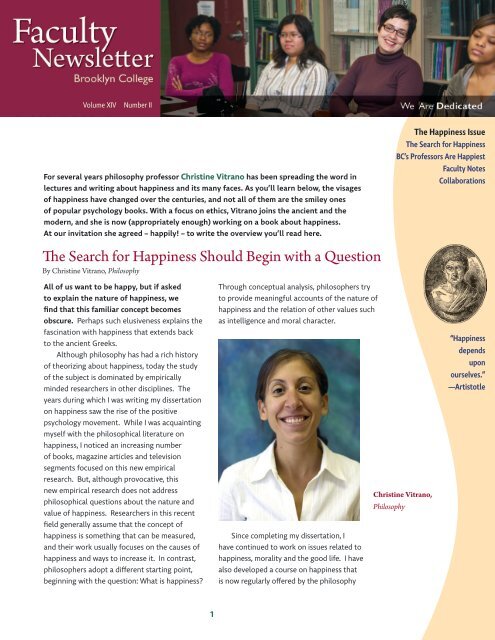
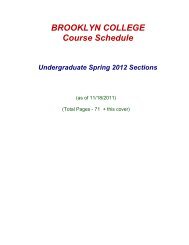

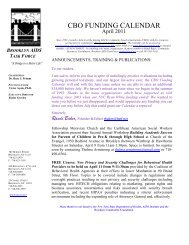
![PHIL 3314: Moral Issues in Business [Lindsay] - Brooklyn College ...](https://img.yumpu.com/12442928/1/190x245/phil-3314-moral-issues-in-business-lindsay-brooklyn-college-.jpg?quality=85)
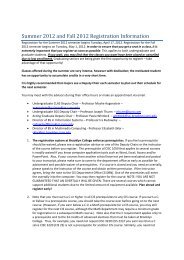
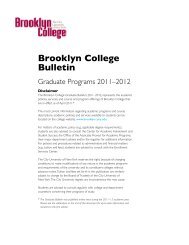
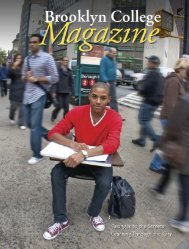
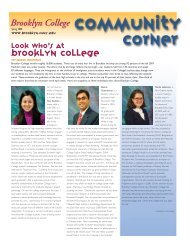

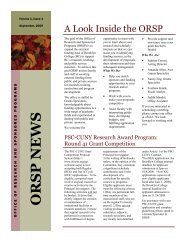
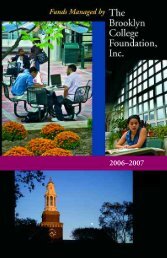
![CORC 3306: Scientific Revolutions [Menser] - Brooklyn College ...](https://img.yumpu.com/5776630/1/190x245/corc-3306-scientific-revolutions-menser-brooklyn-college-.jpg?quality=85)
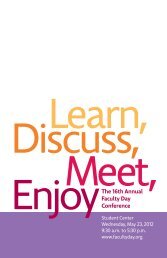
![PHIL 3309: Environmental Ethics [Menser] - Brooklyn College - CUNY](https://img.yumpu.com/5776371/1/190x245/phil-3309-environmental-ethics-menser-brooklyn-college-cuny.jpg?quality=85)
